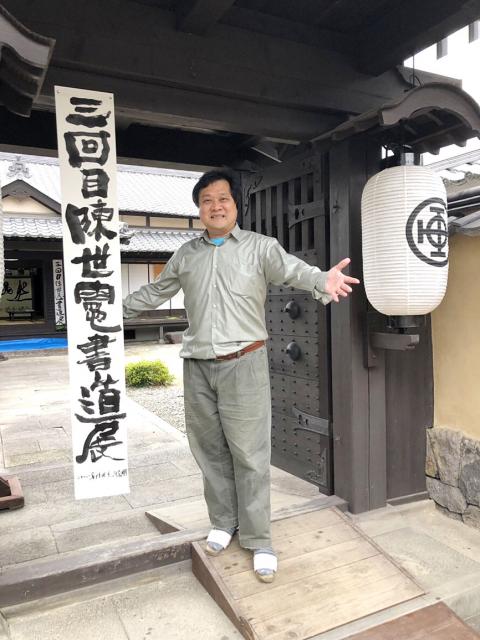Taiwanese calligrapher Chen Shih-hsien (陳世憲), who has long promoted cultural interaction with Japan, was on Friday last week invited to be a goodwill ambassador of Taketa City.
Chen said he first visited the city in Kyushu more than 20 years ago to visit a museum renovated from a samurai’s residence more than 400 years ago.
“At the time I thought to myself: ‘One day, I will hold an exhibition here,’” Chen said.

Photo courtesy of Chen Shih-hsien
He later met a retired teacher in Taketa and the two became fast friends, leading to the city becoming his “home away from home,” which he vowed to visit at least once every year, Chen said.
Taketa in the southwest corner of Oita Prefecture is home to Oka Castle, a remnant of Heian Period architecture. The castle was popularized by local songwriter Taki Rentaro’s Kojo no Suki (Moon Over the Ruined Castle).
In 2015, Chen finally fulfilled his wish and held a calligraphy exhibition at the museum.
The exhibition also featured his two books: Taketa and I (竹田因緣) and Traveling Word — Chen Shih-hsien’s Calligraphy Around the World (字遊─陳世憲的書法世界旅行).
Both books contain stories of his interactions with people in Taketa, Chen said, adding that he often goes to sing Kojo no Suki at karaoke when he misses his friends in Taketa.
The city said it began arranging visits to Kaohsiung’s Tienliao District (田寮) in 2015 and last year made official its cultural tourism ties with the district.
Chen held his third exhibition in Taketa during the Chikuraku Festival, which took place from Friday to Sunday, and wrote a haiku to commemorate a statue of a woman carved by Japanese sculptor Fumio Asakura.
The festival has been celebrated annually since 2000, when it was started as a way to maintain local bamboo groves and attract tourists.
Asakura mentored Taiwanese sculptors Huang Tu-shui (黃土水) and Pu Tien-sheng (蒲添生) when they were studying in Tokyo, Chen said.
Taketa Mayor Katsuji Shuto presented Chen with the goodwill ambassador honor, while Chen said he would invite a group of Taiwanese artists to attend a newly constructed performance hall in the city.

The manufacture of the remaining 28 M1A2T Abrams tanks Taiwan purchased from the US has recently been completed, and they are expected to be delivered within the next one to two months, a source said yesterday. The Ministry of National Defense is arranging cargo ships to transport the tanks to Taiwan as soon as possible, said the source, who is familiar with the matter. The estimated arrival time ranges from late this month to early next month, the source said. The 28 Abrams tanks make up the third and final batch of a total of 108 tanks, valued at about NT$40.5 billion

A group from the Taiwanese Designers in Australia association yesterday represented Taiwan at the Midsumma Pride March in Melbourne. The march, held in the St. Kilda suburb, is the city’s largest LGBTQIA+ parade and the flagship event of the annual Midsumma Festival. It attracted more than 45,000 spectators who supported the 400 groups and 10,000 marchers that participated this year, the association said. Taiwanese Designers said they organized a team to march for Taiwan this year, joining politicians, government agencies, professionals and community organizations in showing support for LGBTQIA+ people and diverse communities. As the first country in Asia to legalize same-sex

Travel agencies in Taiwan are working to secure alternative flights for travelers bound for New Zealand for the Lunar New Year holiday, as Air New Zealand workers are set to strike next week. The airline said that it has confirmed that the planned industrial action by its international wide-body cabin crew would go ahead on Thursday and Friday next week. While the Auckland-based carrier pledged to take reasonable measures to mitigate the impact of the workers’ strike, an Air New Zealand flight arriving at Taipei from Auckland on Thursday and another flight departing from Taipei for Auckland on Saturday would have to

MOTIVES QUESTIONED The PLA considers Xi’s policies toward Taiwan to be driven by personal considerations rather than military assessment, the Epoch Times reports Chinese President Xi Jinping’s (習近平) latest purge of the Chinese People’s Liberation Army (PLA) leadership might have been prompted by the military’s opposition to plans of invading Taiwan, the Epoch Times said. The Chinese military opposes waging war against Taiwan by a large consensus, putting it at odds with Xi’s vision, the Falun Gong-affiliated daily said in a report on Thursday, citing anonymous sources with insight into the PLA’s inner workings. The opposition is not the opinion of a few generals, but a widely shared view among the PLA cadre, the Epoch Times cited them as saying. “Chinese forces know full well that